Jindal Global Law School Admissions 2026
Ranked #1 Law School in India & South Asia by QS- World University Rankings | Merit cum means scholarships | Early Admissions (Pahse 2) Deadline: 28th Feb’26
The Delhi High Court has finished the CLAT UG 2025 hearing and reserved its judgment on a batch of petitions challenging the CLAT 2025 results. The Delhi HC will hear the pleas challenging the CLAT PG 2025 results on April 21, 2025. A division bench comprising Chief Justice Devendra Kumar Upadhyaya and Justice Tushar Rao Gedela heard all the petitions concerning errors in CLAT UG questions and answers on April 9. The decision on the CLAT UG 2025 petitions will be delivered at a later date.
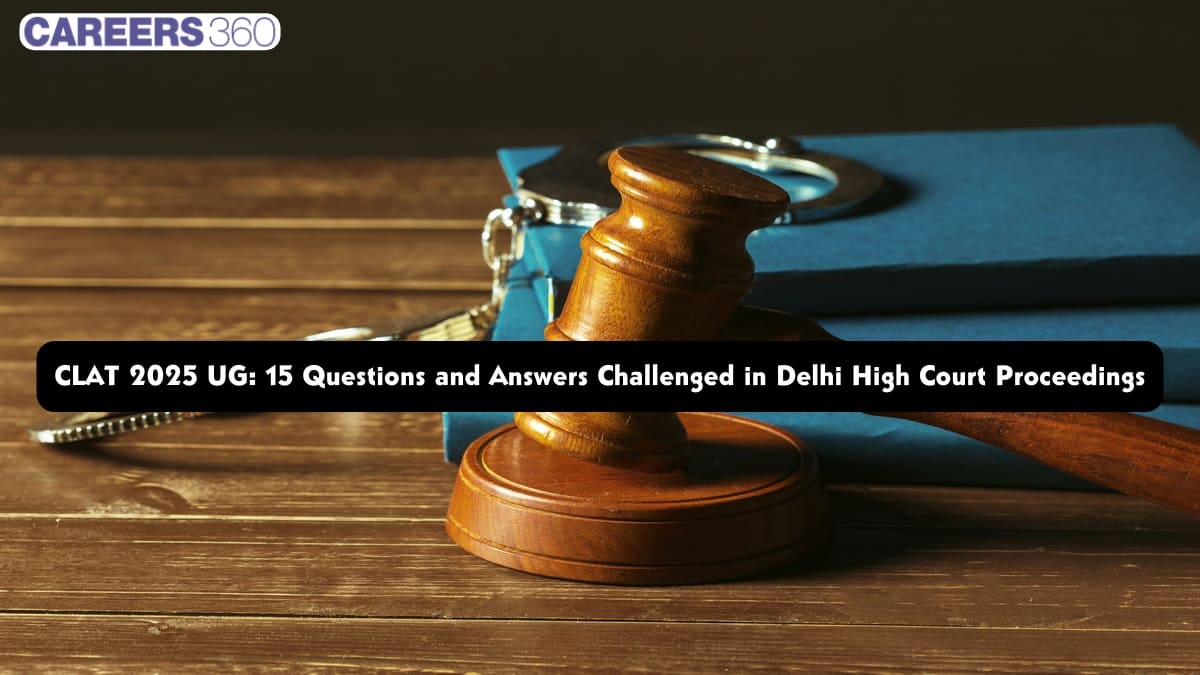
Like other High Courts, the Delhi High Court follows the general provisions of the Code of Civil Procedure (CPC) regarding reserved judgments. The CPC said that reserved judgments are supposed to be delivered within 30 days from the date on which the hearing of the case was concluded. However, the Delhi High Court is expected to deliver the final judgment tentatively in the fourth week of April or the first week of May, 2025. The Consortium of National Law Universities will notify the CLAT 2025 counselling dates once the final judgment is out.
See Also:
The Delhi HC has deferred its verdict on multiple petitions challenging the results of CLAT UG 2025. This year, the CLAT 2025 exam faced a significant backlash, with numerous students across the country pointing out errors in the questions and answers. Despite the Consortium of NLUs standing firm and making minor concessions, dissatisfied students seek judicial intervention.
Ranked #1 Law School in India & South Asia by QS- World University Rankings | Merit cum means scholarships | Early Admissions (Pahse 2) Deadline: 28th Feb’26
Among top 100 Universities Globally in the Times Higher Education (THE) Interdisciplinary Science Rankings 2026
On December 20, 2024, Justice Jyoti Singh partially upheld a plea by a 17-year-old CLAT aspirant Aditya Singh, concerning alleged mistakes in the CLAT UG 2025 exam. This decision was appealed before a division bench of the High Court, with the Consortium of NLU arguing that the single judge had wrongly assumed the role of an expert. The candidate also appealed, requesting further revision of his CLAT 2025 results. Subsequently, the consortium of NLU approached the Supreme Court to transfer the case to the apex court. As petitions challenging CLAT 2025 results are pending in other courts, including the Madhya Pradesh and Bombay High Courts, the Supreme Court on February 6 directed that all cases related to CLAT be transferred to the Delhi High Court to avoid parallel proceedings.
The petitioners have highlighted at least 15 disputed questions and answers, though this list may not be comprehensive, as additional pleas were filed after the Consortium of NLU responded. The decision of the CLAT UG 2025 HC hearing is pending before a bench of Chief Justice Devendra Kumar Upadhyaya and Justice Tushar Rao Gedela.
The Consortium of NLUs allowed students to challenge the CLAT 2025 answer key by December 3, with objections reviewed by an Expert Committee and then an Oversight Committee. The Expert Committee, led by a former Vice-Chancellor, suggested changing two answers and dropping five questions. The Oversight Committee, chaired by a former High Court Chief Justice, recommended the withdrawal of 4 questions from the CLAT 2025 final answer key. In court, it was noted that the Expert Committee gave a split decision on 2 logical reasoning questions, and the Oversight Committee disagreed with the Expert Committee's opinion on 2 questions.
Petitioners claimed the Oversight Committee failed to evaluate several questions referred by the Expert Committee without any explanation.
One petitioner stated that “The Oversight Committee failed in performing it's duty as it applied it's mind only in respect of Eight (8) questions in total; and that comprised only four (4) out of the disputed fourteen (14) questions which were placed before it, whereas rest of the l0 disputed questions were never considered,”. Petitioner Aditya Singh states that no reasons were given by both the committees for the correct answers declared by them. Let’s look at the alleged errors by the candidates section-wise.
Numerous objections were raised in the Legal Reasoning section, but the Oversight Committee did not review these. Petitioners emphasised that the syllabus specifies that no prior legal knowledge is needed for these questions. This was something even the High Court pointed out in the last hearing. The Chief Justice remarked, "You are testing legal understanding of a Class 12th student. He would not know consideration. This is for the experts to decide, but I don't know. Will it be possible for a Class 12 student to know the meaning of consideration under Contract Law?"
Question 56. This passage question on Constitutional Law was met with 451 objections.

Questions 77-79: This section includes a passage about void and voidable contracts, based on which questions were asked. One question about the nature of a contract between an adult and a minor received 622 objections. However, 389 objections were filed in another question from the same passage asking candidates to pick which one of the given illustrations would be a void agreement.
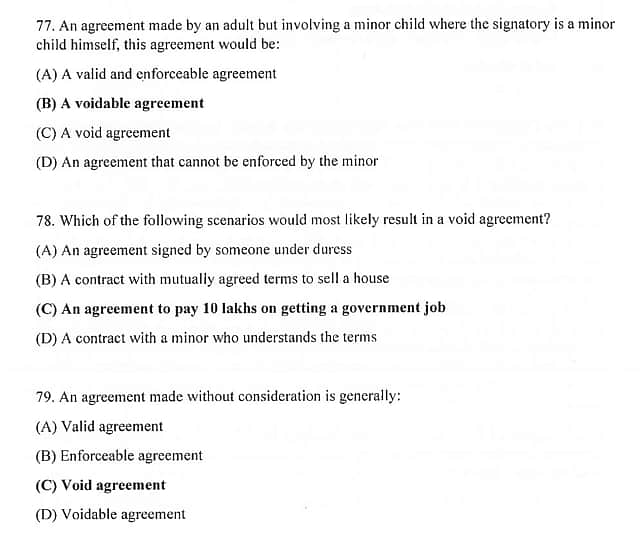
Question 81: A Legal Reasoning passage question on the Public Examinations (Prevention of Unfair Means) Act is also under challenge.
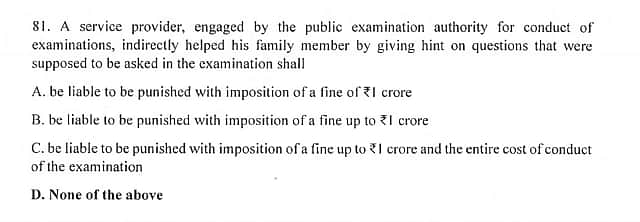
Question 11: A passage question in the English section faced 891 objections due to an apparent error. The Expert Committee and the Oversight Committee differed in opinion on this question. The single judge acknowledged the discrepancy and ordered the Consortium to revise it. The Consortium has appealed against this direction.

Question 37: One question of the Current Affairs section pertains to a passage on the 16th BRICS Summit. The Oversight Committee did not assess this question.
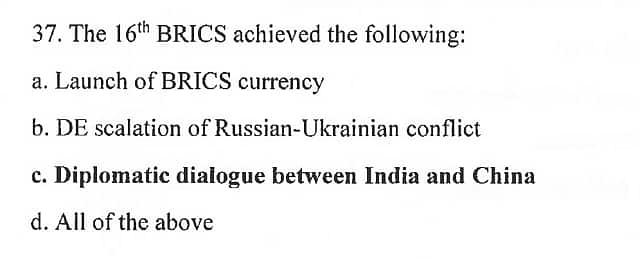
Question 49: Another Current Affairs question, based on a passage on the Nari Shakti Vandan Adhiniyam, was met with 148 objections.

Question 88: A seat arrangement question in this section was recommended for withdrawal by the Expert Committee. However, the Oversight Committee overruled this, deciding instead to change the answer to option D.
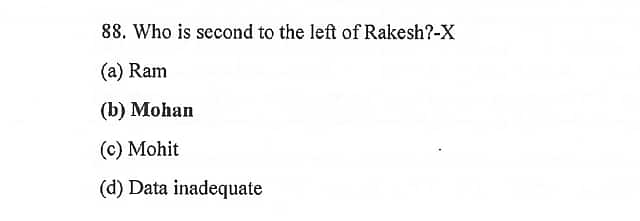
Question 97: A question based on a passage on the impact of COVID-19 and housing insecurity, the Expert Committee gave a split opinion, differing on option C and option D. The Oversight Committee sided with one expert option C as the correct answer.

Question 93: For another question of the same passage, the Expert Committee again gave a split opinion, and the Oversight Committee agreed with the answer chosen by one expert and changed the answer to option C.

Question 91: In the next question of the same passage, the Oversight Committee did not give its opinion.

Question 114: The Expert Committee declared that option D is the correct answer. Meanwhile, the Oversight Committee did not assess the question.
Question 115: The Expert Committee declared option A as the correct answer. The Oversight Committee did not assess the question.

Question 116: It was argued that a mistaken reference to question 115 appeared across all sets of the CLAT UG 2025 exam. However, the serial number of questions differed in each set of the paper. The Expert Committee determined option B as correct, but the Oversight Committee did not assess the question.

Petitioners and many candidates await the court’s decision on the CLAT UG 2025 results, and successful candidates who agree with the CLAT final answer key 2025 are preparing to intervene. One candidate told the court on April 9 that they are supporting the Consortium’s stand. During the CLAT 2025 Delhi HC hearings, the court questioned the paper-setters and the composition of committees reviewing objections in Logical and Legal Reasoning, stating, "You say questions are made by experts. For legal questions, GK, we understand. For logical and quantitative questions, they are part of maths, you do not teach maths. Then who sets these questions?". Regardless of the verdict, the Consortium must improve its objections process and ensure that qualified individuals set the paper and review the candidates' objections.
On Question asked by student community
Hi, you can apply for admissions in Nirma University, NFSU Ahemdabad, Alliance, IPU University and affiliated instiutes (in case you are reserved category candidates), UPES Dehradun, BITS Law School etc.
Start preparing for CLAT by first understanding the exam pattern and syllabus, which includes English, Current Affairs, Legal Reasoning, Logical Reasoning, and Quantitative Techniques. Make a simple daily routine and begin with basics read newspapers regularly for current affairs, practice comprehension passages for English and legal sections, and solve basic
Hello,
With a CLAT AIR of 33599 and SC category rank of 2103, and being a Delhi domicile, your chances at IP University (GGSIPU) are moderate to good, especially in later counselling rounds.
Based on previous year trends, some IPU-affiliated law colleges have closed at higher SC category ranks, so
Hello,
The counselling and seat allotment process for CLAT 2026 has already begun and with seats reserved for various categories including OBCs
They have not separately released the list for OBC for Lucknow NLU , they releases a round wise allotment list and allot them seats according to their rank.
Hello
With an AIR of 9076 and EWS rank of 846 in CLAT 2026, getting a top NLUs is unlikely, which is why you didn’t get a seat in the first round. However, you still have some chances in lower-tier NLUs like NLU Odisha, NLU Assam, NLU Tripura, NLU Meghalaya,
Among top 100 Universities Globally in the Times Higher Education (THE) Interdisciplinary Science Rankings 2026
NAAC A+ Accredited | Among top 2% Universities Globally (QS World University Rankings 2026)
Admissions open for B.A. LL.B. (Hons.), B.B.A. LL.B. (Hons.) and LL.B Program (3 Years) | School of Law, MRU ranked No. 1 in Law Schools of Excellence in India by GHRDC (2023)
Moot Court | Mock trials | Legal Aid Clinic
NAAC A++ Accredited | Ranked #11 by NIRF
#14 in India by NIRF Ranking | NAAC A++ accredited | Approved by BCI | Scholarships Available